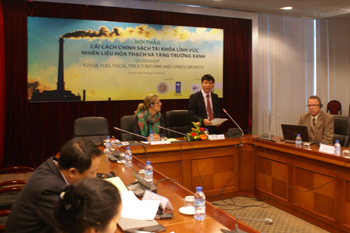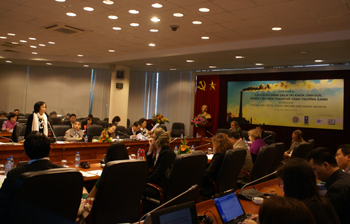|

|
Prof. Dr. Nguyen Quang Thuan, Vice President of Vietnam Academy of Social Sciences (VASS) making the opening speech |
|
Participating in the conference there were Prof.Dr. Nguyen Quang Thuan, Vice President of Vietnam Academy of Social Sciences (VASS); Mrs. Louise Chamberlain, Director of UNDP in Vietnam; scientists and researchers of VASS, Ministry of Planning and Investment, UNDP and Vietnamese and international experts.
Prof. Dr. Nguyen Quang Thuan and Mrs. Louise Chamberlain made speeches opening and welcoming the Conference.
According to Vice President of VASS, Prof. Dr. Nguyen Quang Thuan, the conference was obsolutely meaningful in the context of Vietnam to implement the restructuring process, innovating growth model with 3 strategic breakthroughs in: the institutions, the infrastructure and the human resources of high quality. The main orientation is to complete the transition to market mechanism, energy market plays a very important role for the economy, this is a strategic input for every goods and service production. The gradual elimination of energy subsidies is an important part of economic restructuring process. This forces enterprises to replace outdated technologies with energy conservation technologies, encourages private sector to invest in this area, and promotes the transition towards green growth to ensure the sustainability in all aspects, especially the environment.
Positive impacts of this reform on growth in the long term is clear. However, negative ones on enterprises and residents in the short term is inevitable. To ensure the social sustainability, it is neccessary to avoid creating shocks to enterprises by providing proper and transparent schedules, and there should be effective measures to protect the poor and the vulnerable from energy price increases. These are important contents for effectiveness and sustainability which are the top concerns of Vietnam in the current development stage after nearly 30 years of Doi moi implementation.
|

|
Ms. Vu Xuan Nguyet Hong, Deputy Director of the Central Institute for Economic Management presenting his paper at the Conference |
|
Ms Louise Chamberlain said that it was a topic which is obsolutly supported by the policy makers, UNDP also committed to support the green growth strategy signed in 2012. According to Director of UNDP in Vietnam, three main points should be focussed in the Conference:
First, Vietnam is not a significant emitter of greenhouse gases, in global context the price subsidy for fossil fuels is not that outrageous, but it is neccessary to determine the level of price subsidy in relation with ODA sources.
Second, a more effective development should be taken into account especially when the indirect subsidies are removed, what should be done to reach the proper price that all the sides participating in Vietnam market accept. Thus, it is necessary to focus on the efficient operation of the market.
Third, in the current fiscal situation of Vietnam , energy security should also get benefits from the reform process, and it may enhance macroeconomic stability, at the same time it is necessary to strengthen support for poverty reduction . Here, the issue of multi-object in fossil fuel fiscal reform should be paid attention to. Ensuring a stable supply of fuels for the poor to have access to services is the fundamental task for poverty reduction as well as to improve economic activities, particularly in the areas with the poor.
Four papers were presented including: “Green growth strategy – national and global context” (by Ms. Vu Xuan Nguyet Hong, Deputy Director of the Central Institute for Economic Management (CIEM), Ministry of Planning and Investment), “Benefits and Challenges of fossil fuel fiscal reform” (Mr. Nguyen Thang, Director of Center for Analysis and Forecast, VASS), “Fossil fuel fiscal policy – Policy proposal for reform process” (Dr. Michaela Prokop, UNDP economic advisor), “Low carbonic development and energy price reform” (Mr. Christophe, World Bank).
In his presentation, Ms. Vu Xuan Nguyet Hong stated that green growth is a global trend in the context of climate change, fiscal reform for fossil fuels is an integral part of the policy framework for green growth. Vietnam is moving toward green growth, reforming the energy sector and gradually eliminating subsidies for fossil fuels. The Government of Vietnam has shown a commitment to green growth and sustainable development of the country, they are also implementing many policy solutions related to fiscal reform for fossil fuels, however this process is slow and long.
Mr. Nguyen Thang said that the benefits of fossil fuel fiscal reform in Vietnam have contributed to the improvement of the nation's energy supply, maintaining national energy security, energy supplying service will be improved and the fiscal burden will be reduced, promoting GDP growth, improving equity and reducing environmental impact.
According to Dr. Michaela Prokop, fossil fuel subsidy reform is not just about the price but the whole energy sector, including: developing competitive energy markets in which state-owned enterprises and private ones operate on a fair playground, strengthening the role and capacity of the independent management agencies, transferring the social functions of state-owned enterprises; properly setting the price of electricity and oil products, having oil price stabilization fund; having supporting policies for poor and near-poor people, improving social security ...
Mr. Christophe Crepin said that the reform of fossil fuel subsidies has become one of the top priorities of the World Bank Group, one of the bold actions that the World Bank will make to solve the problems of climate change. Energy prices and subsidy reforms in Vietnam have specific interactions with climate change as direct price is currently not a major fiscal challenge.
Scientists/researchers said that Vietnam is applying a price ceiling for electricity and fossil fuels, with a huge indirect price subsidy for energy by the Government. These policies are not sustainable, making more benefits for the wealthy than for the poor, as well as going against the growth and modernization in the future, while also making contributions to climate change. Fossil fuel fiscal reform has economic, social and environmental benefits. This reform is consistent with the objectives of the National Strategy for Green Growth and requires to strengthen the reform of energy markets and state-owned enterprises operating in the energy sector .
The experts of the UN Agency for Development in Vietnam suggested that fossil fuel subsidy reform is not only about price, but also the whole energy sector.
Nguyen Thu Ha







